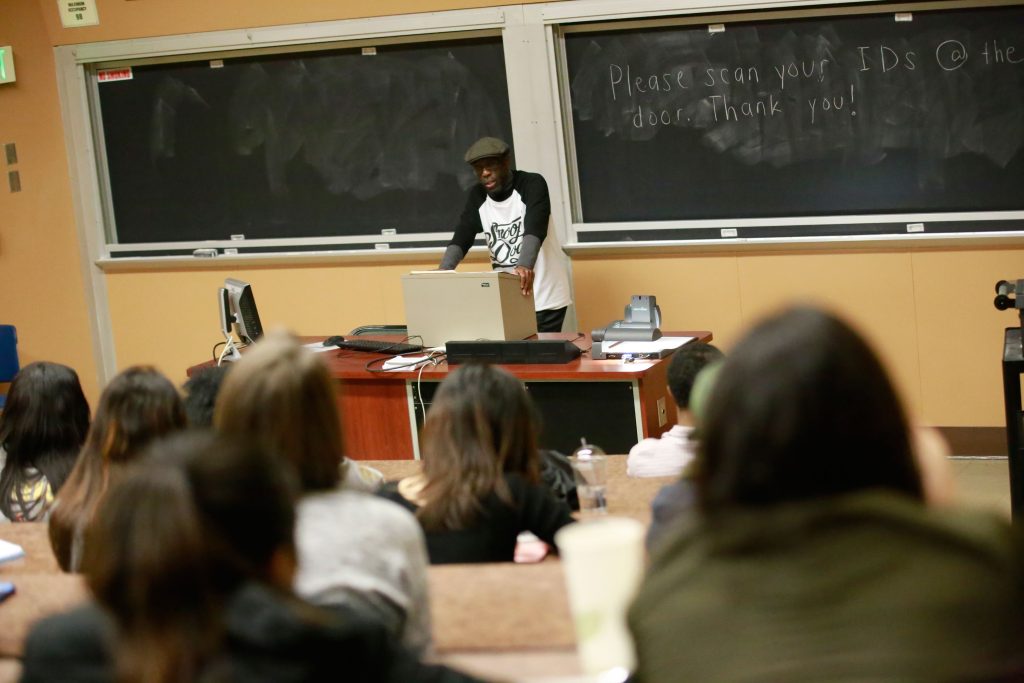
Donning a Snoop Dogg ‘92 T-shirt and a flat-brim cap, Binghamton University sociology department chair Michael West addressed a room of about 80 students in a discussion about the African American struggle, the evolution of black liberation and the Black Lives Matter movement on Monday evening in Lecture Hall 9.
The talk, titled “A Discussion of the History of Black Liberation and the Emergence of the Movement for Black Lives in Culture Events,” was part of the revitalized Student Association (SA) Spotlights series. Hosted by the SA Programming Board and the Vice President of Academic Affairs (VPAA) office, SA Spotlights aims to highlight distinguished faculty members and their research.
West’s talk focused on the global black struggle, the fight for equality and the current direction of the Black Lives Matter movement.
“It is a radical and transformative vision,” West said. “It is an anti-racist vision, an anti-war vision, an anti-capitalist vision. It is a vision for black lives.”
West spoke about the internationalist perspective of black liberation and drew connections from colonial slavery to the global Black Power movement as a necessary background for understanding Black Lives Matter. West cited the Declaration of Independence and the U.S. Constitution as roots of racial inequality in the United States.
“The American creed — the American social contract — was originally constructed in opposition to black liberation,” West said. “Black people in the United States have had to conceive their liberation in global terms, in international terms.”
Ann Merriwether, a professor of psychology, was scheduled to be the first faculty member spotlighted back in September but the program fell through with former SA VPAA Adam Wilkes’ resignation.
Max Maurice, SA vice president for programming and a senior majoring in electrical engineering, said he revived the program with Raul Cepin, the current VPAA and a senior majoring in Latin American and Caribbean Area studies. According to them, West was the perfect faculty member to spotlight next.
“When looking into professors to host, it was hard to ignore the positive reviews of Dr. West,” Cepin said. “It is an honor to have him present and educate the campus community, but particularly during Black History Month.”
According to Cepin, he and half of the SA Executive Board are currently enrolled in BU’s Black Lives Matter course.
Jessica Dunn, a senior triple-majoring in sociology, Africana studies and Latin American and Caribbean Area studies, said West is her favorite professor at BU because of his engaging and insightful lectures.
“[West] showed how different, seemingly unrelated periods of time are tied together by this common vision that has yet to be realized, even today,” Dunn said.
Hannah Pollick, a senior double-majoring in psychology and sociology, said she appreciated West’s ability to paint the history of the black struggle clearly. She said it is important that students are constantly reminded that black people have never been able to stop fighting for their liberation.
“The struggle for black freedom is seemingly unending, and that is profoundly sad,” Pollick said.
West was positive about the future of the Black Lives Matter movement but emphasized the need for social action, especially in the era of Donald Trump’s presidency.
“Black faces in high places do not equate to black power,” West said, when reflecting on Barack Obama’s former presidency. “It is a mirage of black power. A mirage that is not even in evidence here at Binghamton University.”


